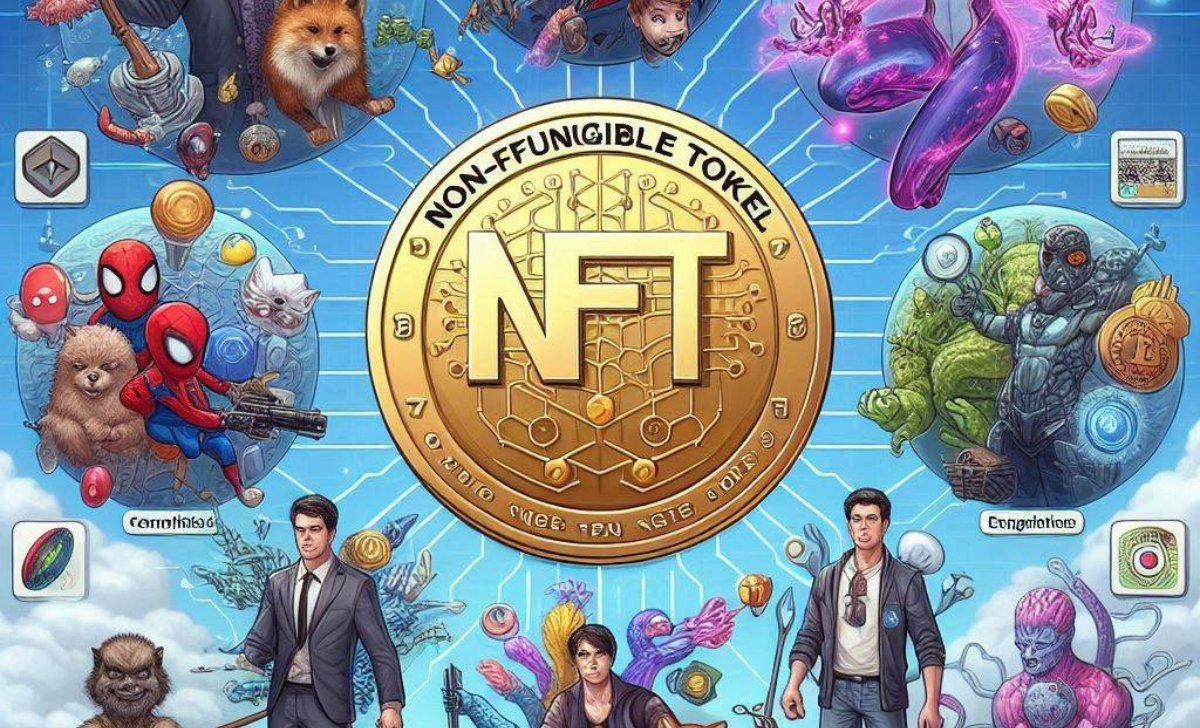NFT vs Cryptocurrency are two widely recognized concepts in the blockchain world, yet they are often confused with each other. While both are digital assets traded on blockchain, their differences are significant.
In this article, TopCoin9 will help you understand the definitions, key differences, and real-world applications of NFTs and Cryptocurrencies, as well as which asset might be the better investment!
What is Cryptocurrency?

Cryptocurrency is a type of digital currency that utilizes blockchain technology to ensure security and decentralization. When comparing NFTs vs fungible tokens, the key difference lies in their interchangeability. Unlike traditional currencies issued by central banks, it operates based on cryptographic algorithms and is not controlled by any organization.
Some popular cryptocurrencies include:
- Bitcoin (BTC): The first and most valuable cryptocurrency today.
- Ethereum (ETH): Not only cryptocurrency but also a platform that supports smart contracts.
- Stablecoins (USDT, USDC): Cryptocurrencies pegged to the value of the USD to reduce price volatility.
Thanks to its high security and fast transactions, cryptocurrency is increasingly used in payments, investments, and decentralized finance (DeFi) solutions. But does NFT work the same way as cryptocurrency? Let’s find out below!
What is NFT?

NFT (Non-Fungible Token) is a type of digital asset that is unique and irreplaceable. Unlike cryptocurrencies, which can be exchanged on a one-to-one basis (1 BTC = 1 BTC), each NFT holds a distinct value and cannot be substituted with another NFT.
NFTs are commonly used to represent:
- Digital art: Paintings, images, videos, and music in digital format.
- Gaming and Metaverse: In-game items, virtual land, and digital identities.
- Collectibles: Digital trading cards and rare items.
Prominent NFT collections like Bored Ape Yacht Club and CryptoPunks have transformed the digital art market, creating a new investment trend. But how do NFTs and cryptocurrencies differ? Check out the detailed comparison table below!
Key Differences Between NFT vs Cryptocurrency
Although both NFTs and cryptocurrencies utilize blockchain technology, the difference between NFTs and crypto lies in their fundamental nature and use cases. Specifically as:
| Element | Cryptocurrency | NFT |
| Substitutability | Fungible | Non – Fungible |
| Unit of value | Standard tokens like BTC, ETH | Each NFT is unique |
| Application | Trading, investing, payment | Digital art, games, metaverse |
| Blockchain uses | Bitcoin, Ethereum, Binance Smart Chain… | Mainly on Ethereum, Solana, Polygon… |
| Divisibility | Can be divided | Indivisible |
This demonstrates that NFTs cannot be used as a substitute for cryptocurrencies in financial transactions. However, they have unique applications of their own. So how are NFT vs Cryptocurrency used in real-world scenarios? Let’s explore in the next section!
Use Cases of NFT vs Cryptocurrency

NFT vs Cryptocurrency are not just digital assets; they also have numerous real-world applications in life and business. Here’s how each type is being utilized across different industries:
Use Cases of Cryptocurrency
Cryptocurrency is not only an investment vehicle but also has various practical applications:
- Payments and Financial Transactions: Many major companies, such as Tesla and Microsoft, have accepted Bitcoin as a payment method. This enables fast and secure cross-border transactions without the need for banks.
- Investment and Store of Value: Bitcoin is considered “digital gold” due to its limited supply and is trusted by many as a value-preserving asset. Investors use Bitcoin to hedge against inflation and diversify their portfolios.
- Smart Contracts and DeFi: Ethereum has paved the way for a decentralized finance (DeFi) ecosystem, where users can lend, borrow, and trade without intermediaries. This increases transparency and reduces transaction costs in the financial sector.
While cryptocurrency focuses on financial transactions, NFTs are making a significant impact in art and entertainment. Let’s dive into the applications of NFTs below!
Use Cases of NFT
NFTs have transformed the way we perceive digital assets:
- Digital Art: NFTs allow artists to sell their work directly to buyers without intermediaries. This not only provides better income for artists but also ensures transparent ownership on the blockchain.
- Gaming and Metaverse: In-game items such as skins, weapons, or characters can be traded as NFTs. Players can own and trade these assets on NFT marketplaces, giving them real-world value beyond the game.
- Virtual Assets and Digital Ownership: NFTs verify ownership of virtual land and assets in the Metaverse, such as Decentraland and Sandbox. Users can buy, sell, or rent these assets, creating a new digital real estate market.
So, if you’re looking to invest, should you choose NFTs or cryptocurrency? Let’s analyze the pros and cons of each in the next section!
Should You Invest in NFTs or Cryptocurrencies?

Both NFT vs Cryptocurrency offer profit potential, but each type of asset comes with its own characteristics and risks. Let’s examine the advantages and disadvantages of each to make an informed investment decision.
Investing in Cryptocurrency
Cryptocurrency is a popular choice among investors due to its flexibility in trading and strong growth potential. However, it is also a highly volatile market.
Pros:
- High liquidity, making it easy to buy, sell, and trade.
- Widely accepted for financial transactions and payments.
- Bitcoin and Ethereum have long-term value appreciation potential.
Cons:
- High price volatility, which can pose significant risks for investors.
- Some countries restrict or ban cryptocurrency transactions, impacting the market.
If you’re more interested in unique and creative digital assets, NFTs could be another investment avenue worth considering. Let’s explore more below!
Investing in NFT
NFT investing is more than just a trend — it presents various opportunities in art, entertainment, and the Metaverse. However, its value heavily depends on market demand.
Pros:
- Each NFT is unique and can appreciate over time if it possesses rarity and exclusivity.
- Widely used in digital art, gaming, and Metaverse.
- Allows artists and content creators to sell their work directly without intermediaries.
Cons:
- Lower liquidity compared to cryptocurrencies, making it harder to sell if there’s no buyer.
- NFT values are highly influenced by market trends and community interest.
If you’re passionate about art, collectibles, or believe in the future of the Metaverse, NFTs could be a promising investment. Regardless of whether you choose NFTs or cryptocurrencies, thorough research and a clear strategy are essential to minimizing risks.
Both NFT vs Cryptocurrency present exciting investment opportunities, but each has its own unique characteristics and applications. We hope this article has helped you understand their differences so you can make the right decision. Thank you for reading! Don’t forget to follow TopCoin9 for more insightful articles on blockchain and investing!

Emily Thompson is a highly skilled crypto writer and strategist with extensive experience in blockchain journalism, having contributed to Cointelegraph and Binance Academy. At TopCoin9, she ensures high-quality, SEO-optimized content that educates and informs the crypto community.
Email: [email protected]












